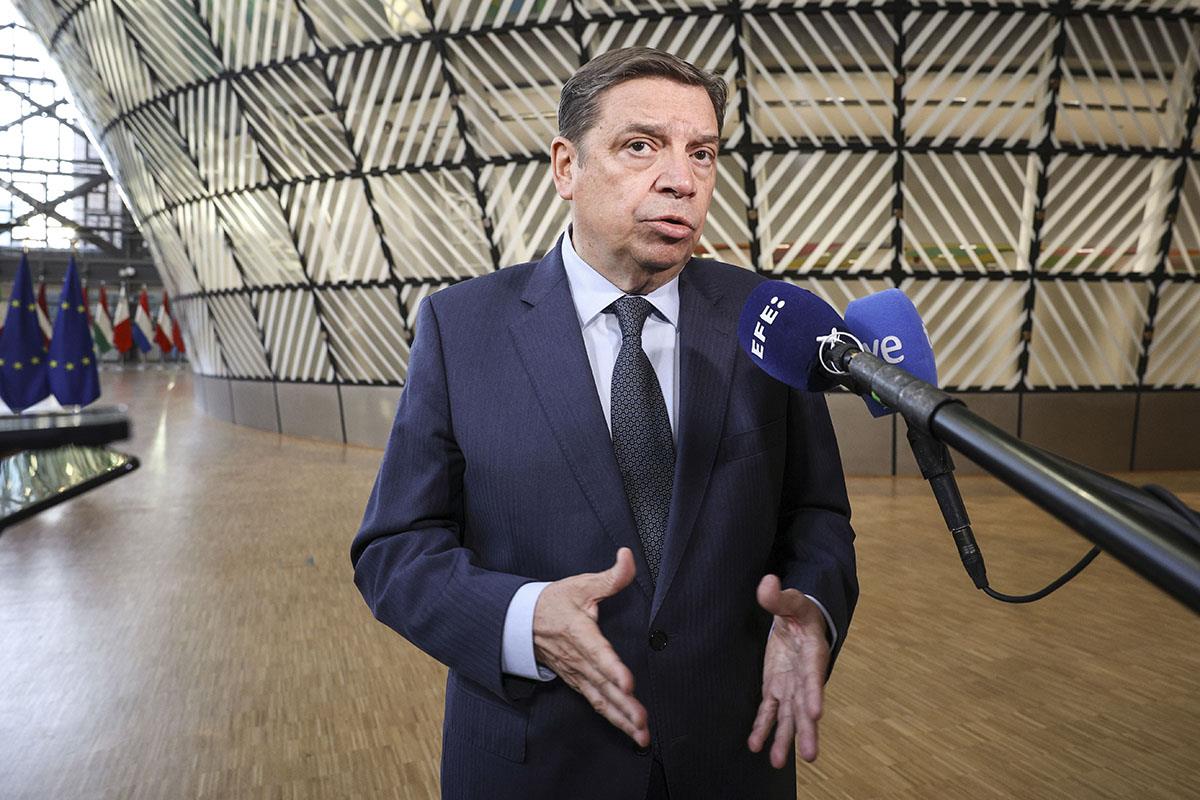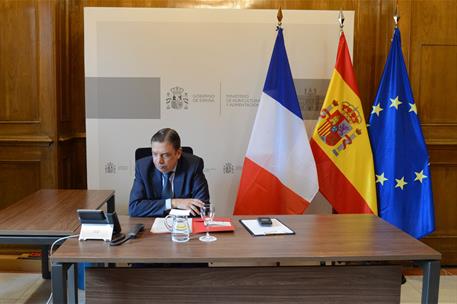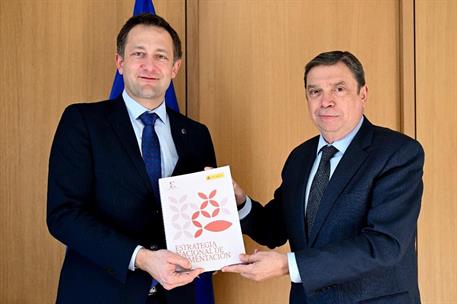EU Agriculture and Fisheries Council of Ministers
Spain offers its collaboration to the Polish presidency of the EU in order to make progress in improving the competitiveness of the agricultural sector
News - 2025.1.27
 The Minister for Agriculture and Fisheries, Luis Planas, addresses the media upon his arrival at the meeting of the Ministers of Agriculture of the European Union (EFE)
The Minister for Agriculture and Fisheries, Luis Planas, addresses the media upon his arrival at the meeting of the Ministers of Agriculture of the European Union (EFE)
The Minister for Agriculture, Fisheries and Food, Luis Planas, has offered the Polish presidency of the European Union (EU) Spain's collaboration and experience in order to make progress in matters that continue to be a priority: improving competitiveness, with the application of New Genomic Techniques (NTG), which allow crops that are better adapted to current production conditions and fair remuneration for farmers and stockbreeders.
Today's Council of EU Agriculture and Fisheries Ministers in Brussels marks the start of the Polish presidency, during which Spain will focus on making progress on the regulation of NTGs. Progress in these new technologies is necessary to ensure that the EU agricultural sector remains at the forefront and has the necessary tools to meet the climatic challenges, leading to improved farm profitability.
The minister recalled that the European Commission has already made a proposal and that "it is necessary to make it available to farmers and stockbreeders so that they can have seeds that are better adapted to climate change and new production conditions."
In the point on the situation of agricultural markets related to trade, Planas insisted, with regard to Mercosur, that it is a "necessary, timely and positive" agreement for the European Union, which after 25 years of negotiations has found a good basis for cooperation with these South American countries that must be taken advantage of.
The minister explained that, given the current uncertainties in international trade, it is highly desirable for Europe to diversify its trade possibilities. In light of Donald Trump becoming President of the United States, Planas recalled that this country is, after the United Kingdom, the main destination for EU agri-food exports and that the EU's aim is to "preserve the situation and maintain cordial and positive relations."
The opportunities offered by the agreement with Mercosur to Spanish products are much greater than defensive interests and he pointed out that there are mechanisms such as the safeguard clause or the contingency fund in case it is necessary to activate them, he stressed.
Planas stressed that "any product that enters the EU market must comply with requirements equivalent to those demanded of Europeans." The EU must move to integrate environmental aspects into the process of setting Maximum Residue Limits, including import tolerances. Efforts must be made to increase the resources and tools of the competent authorities to carry out thorough and systematic import controls. The aim is to detect and withdraw products from the market that do not comply with the requirements set out in European regulations. In parallel, the authorisation system for new plant protection active substances must be streamlined, so that farmers have the most appropriate production tools available to them.
Another objective of this new period is to strengthen the position of farmers in the food chain. Planas said that, in view of the review of the regulation on unfair commercial practices, an initiative taken by the European Commission following the mobilisations of farmers and stockbreeders in the first few months of last year, Spain's experience should be taken into account.
The ministry undertook pioneering changes in the food chain law, such as the obligation of written contracts or the so-called sale at a loss, in order to balance relations and improve the remuneration of all links in the chain, especially the weakest, the producers. The minister pointed out that this is an issue that could be considered the third pillar of the Common Agricultural Policy (CAP) and valued the launch of the European chain observatory because it means improved coordination between national authorities. The minister stressed that, within the framework of the Common Market Organisation, which is currently under review, there is an urgent need to increase the allocation of the agricultural reserve in order to respond quickly to new uncertainties arising from the effects of the climate or the geostrategic situation. "We welcome the proposal to increase the EU's financial contribution to the operational programmes for fruit and vegetables to 70% in the event of natural disasters," he said.
Reform of the Mediterranean fisheries regulation
Spain, with the support of France and Italy, brought the debate to this Council of Ministers to initiate the revision of the Multiannual Management Plan for the Western Mediterranean because, since its application began five years ago, it is imperative to take stock, because the trawl fishing sector has made significant efforts and sacrifices, and to expand the possibilities for sustainable fishing.
The minister pointed out that the difficulties in the negotiation of quotas for this year at the Council of Ministers last December, in which a drastic cut was applied to fishing possibilities in the Mediterranean, alleviated by the application of selective measures, are largely due to the stipulations of the regulation. "We can't go on like this, there is a regulatory problem and it needs to be solved," he said.
He explained that it is necessary to recognise the mixed nature of Mediterranean fisheries in order to achieve the Maximum Sustainable Yield of the different species, and not to set quotas solely on the basis of the weakest fishery. In addition, stabilisation elements should be introduced to limit the reduction of fishing days and ensure a minimum break-even point, as well as multiannual compliance measures to give economic security to the fleet. There is also a need to review the assessment model for demersal stocks in the Mediterranean and to use more up-to-date scientific reports.
The minister called for sustainable and forward-looking fisheries management. "The recovery of fish species must be made compatible with the socio-economic viability of the fleet," he said, in line with the Common Fisheries Policy (CFP).
The outbreak of foot-and-mouth disease in Germany was also discussed, as "this fact puts us on alert for the real possibility that any highly transmissible disease could be introduced into our livestock." For Spain, it is essential to "strengthen our early health surveillance systems; to train and raise awareness among our operators of the importance of adopting biosecurity measures and, above all, to have the necessary means and sufficient economic resources to deal with these situations of extreme risk."
Simplification was also discussed at the Council. Planas pointed out that it is necessary to go beyond the modifications already introduced in 2024, and recalled for example that on 15 November 2024, all Member States sent a letter to the European Commission to request an urgent modification of the annual performance settlement procedure, which is based on the comparison of the unit amounts planned and those finally realised, in order to prevent eligible expenditure from being left out of EU funding.
Non official translation






